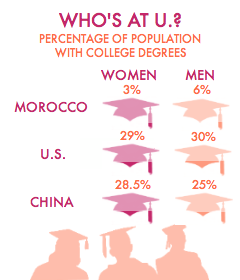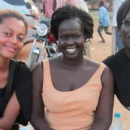
March 7, 2013 | Health and Well-Being, Law and Justice, Violence Against Women, War and Peace
A Fresh Chance for South Sudan’s Women
Helen Animashaun is helping them claim their power.

Helen Animashaun (left) works with the South Sudan Women’s Empowerment Network.
The world’s newest country, South Sudan, is writing a brand-new constitution—and Helen Animashaun sees this as a golden opportunity for women there to gain legal equality, protection from domestic violence and an education. Animashaun works with the South Sudan Women’s Empowerment Network, which since 2005 has been campaigning for women’s economic, social and human rights. She took our questions from her office in Juba.
After decades of civil war, South Sudan gained its independence in 2011. What are the greatest challenges facing women there?
Concepts like the idea that violence against women is wrong are completely new to many South Sudanese. Some people believe hitting their wife or child is a necessary form of discipline rather than abuse. The judicial system is still in development and legal aid is minimal, which can lead to long stays in prison for women, who sometimes have children with them. There are also the post traumatic affects of civil war and remaining tribal conflicts.
What inspired you to work in South Sudan?
I always wanted to volunteer with international development organization VSO, which partners with South Sudan Women’s Empowerment Network because I wanted to give something back and I believe in its ethos of tackling poverty through people. It has been a unique experience to be working in the world’s newest country as it develops structures, systems and its foundations from scratch.
What is SSWEN’s great accomplishment?
We’ve been at the forefront of pushing for changes to support women, including the development of a new national gender policy.
SSWEN has brought women together from all over the country for national conferences and regularly holds intensive training sessions with communities. Too many women do not realize they are entitled to free healthcare if they are pregnant, free education for their children or that they have a share in the estates of their deceased husbands. If women don’t know what their rights are, they don’t have a voice.
The organization also runs a project to address early child marriage, which is part of a global initiative called “Girls Not Bride.”
Tell us about a memorable woman you’ve met.
There was a female chief who came to a three-day training course last year on the transitional constitution. It is not common for women to lead communities and it was a privilege to have her attend.
With the help of UN Women, we give out booklets in Arabic and English which simplify the Bill of Rights in the constitution. She stood up and told us that this would help her to raise awareness of women’s rights and to refer to when she resides over conflicts in her community. This was an extremely powerful moment.
What advice would you give to young women who want to make a difference in the world?
Give yourself as much choice as possible. Greater choice leads to greater opportunity for freedom. Ask questions; do not accept the status quo so you can make informed decisions.
SSWEN is a partner of international development organization VSO, whose volunteers tackle poverty in more than 30 of the world’s poorest countries. For more information on VSO, please visit www.vso.org.uk.